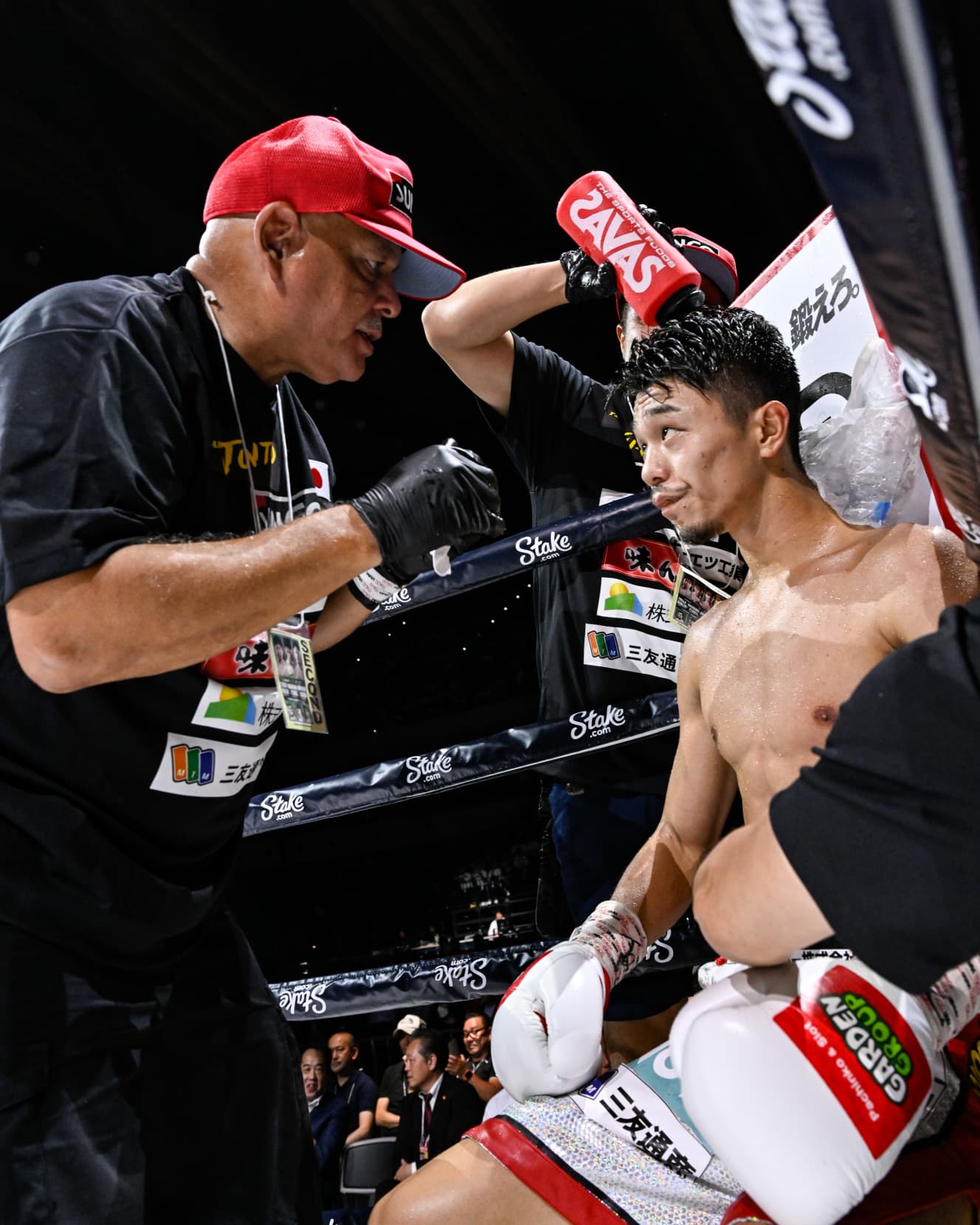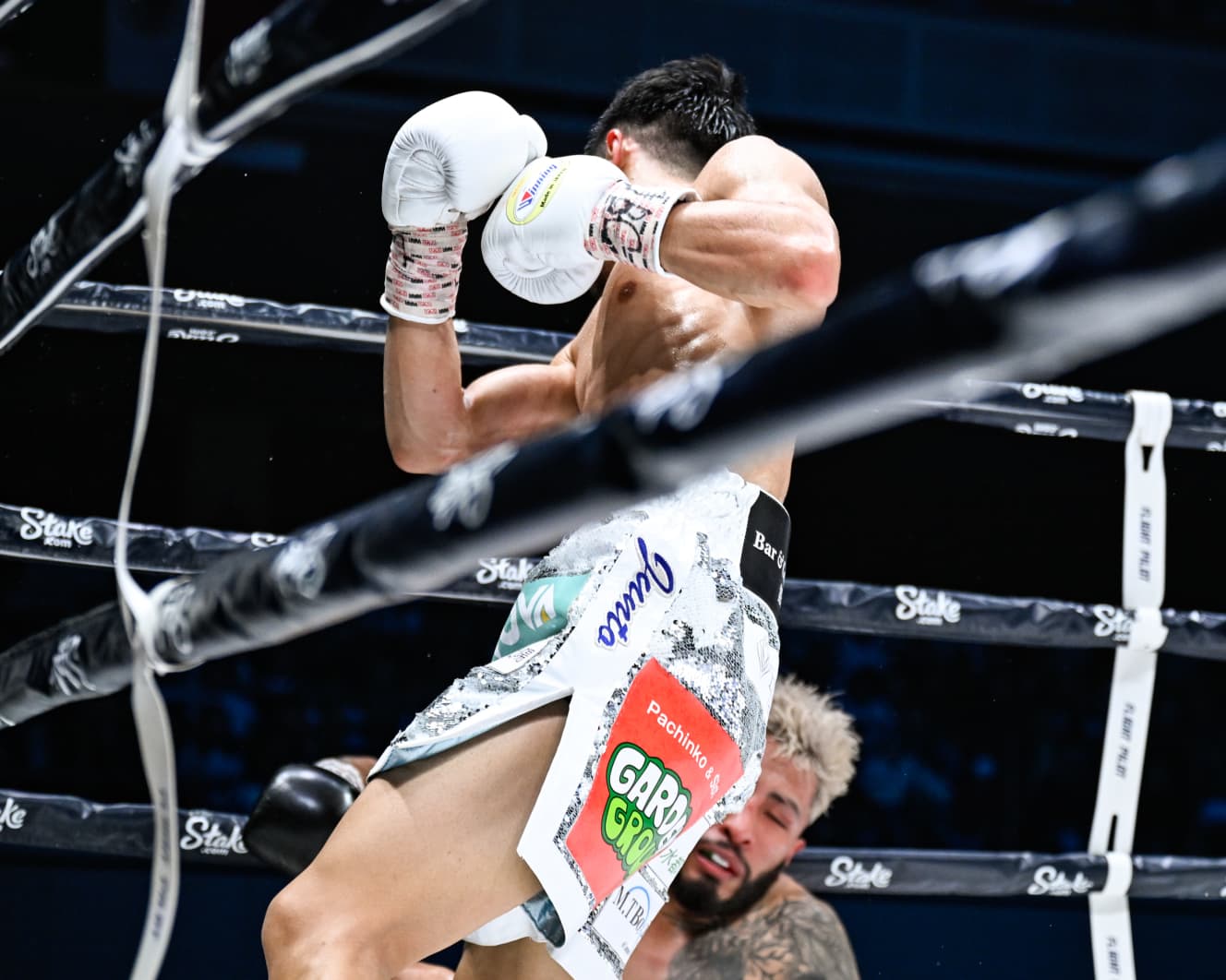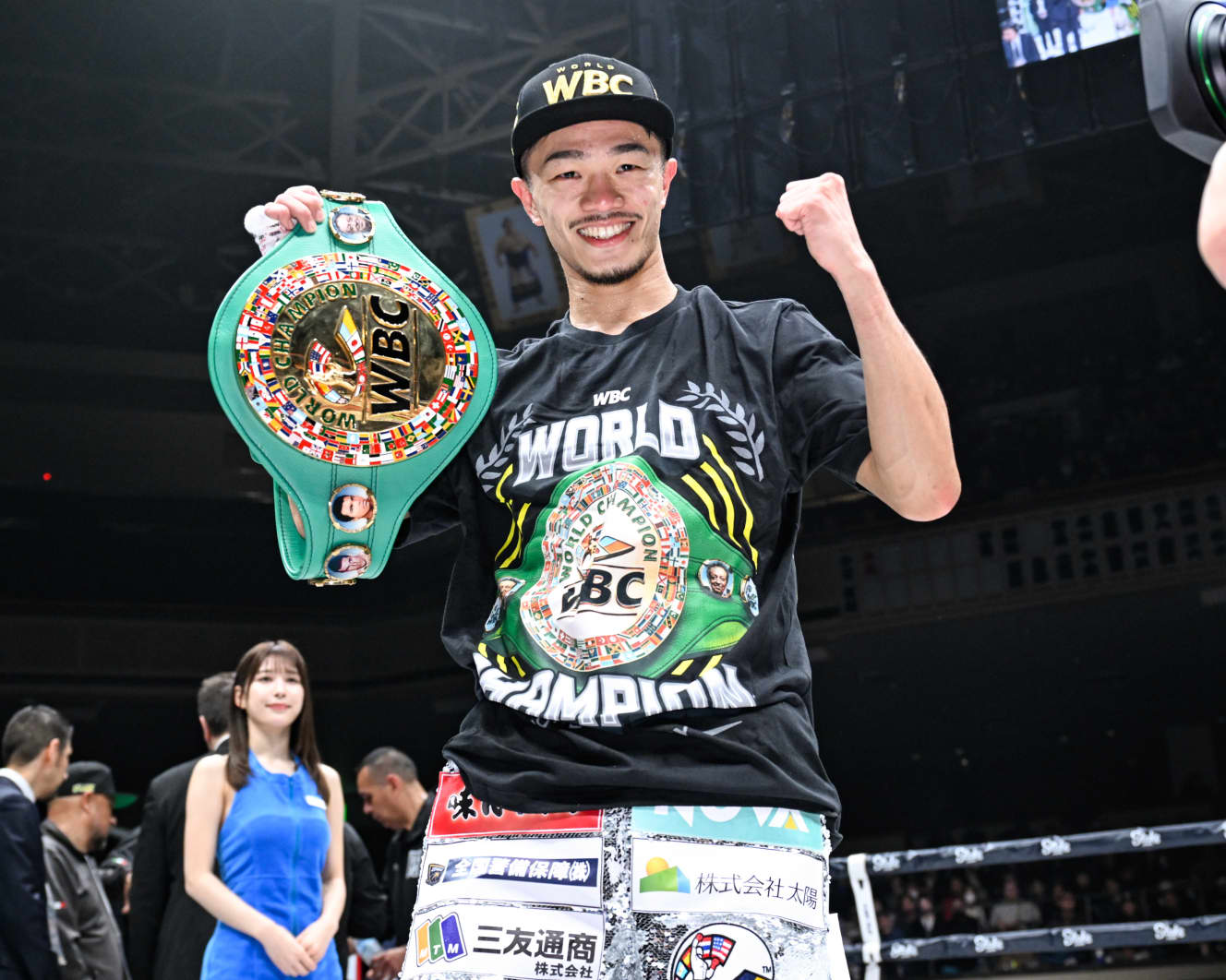I want to fight Takuma Inoue!” Jyunjin Nakatani, “the man who chases after monsters,” looks back on his “three-weight championship with a smile on his face.”
I had a lot of fun this time. I couldn’t help but smile naturally. I think this was what I would call my best bout.”
Nakatani, who won the WBC bantamweight championship on February 24 by knocking out Alejandro Santiago in six rounds, said 20 hours after the bout that the third belt around his waist was green, following the WBO flyweight and super flyweight belts. In the past, Joichiro Tatsuyoshi, Yasuei Yakushiji, Hozumi Hasegawa, Shinsuke Yamanaka, and Naoya Inoue had all won the belt.
Touching fists with his father for the first time in four years and five months
Nakatani had won two WBO belts, both by decision, and this was his first time challenging a champion.
I felt a good sense of urgency walking down the aisle as a challenger. I had never fought in Ryogoku Kokugikan before, but the ring and the audience were so close together that it felt like I was being squeezed. I could see all around me, and I could see faces I knew.”
Just before walking up the ramp, Nakatani matched his right glove with his father’s right fist.
“‘I’ll do my best. Thank you for everything! I am grateful to him for his support. My parents gave me the environment to pursue what I love.
Nakatani has always felt the warmth of his parents. Since his debut as a professional fighter, he and his father used to clasp fists seconds before stepping into the ring, but the “ritual” between father and son has become impossible since the COVID-19 crisis restricted the use of the hanamichi (flower aisle).
In his fight last September, he struggled with weight loss, unable to lose the last 900 grams. His father, a career chef, supported his son in terms of food. His father, Sumito, recalls, “Last time, I ate apples, oranges, and other foods.
He ate apples and oranges last time, which was not good for his weight loss. I regretted it, so I had him cut back on fruit for the Santiago match, limiting his intake to about three strawberries. Instead, I had him eat hot vegetables such as carrots, cabbage, onions, and mushrooms.
On the Hanamichi, I always put my fists together with the thought, ‘Don’t have any regrets. As far as I remember, this was the first fist touch since Junjin started entering the ring for the World Championships. As any parent would, we are not in the mood for this every match. But this time, he did his job without letting me hit him. I was very moved.”
The parents were seated in the front row at ringside, but their son’s expression was blocked by the steel pole in the blue corner and the backs of the trainers, so they could not see him with the naked eye.
I had no idea that Junko was smiling in the ring. I was heartbroken over here. …… But he has a great mentality. I am amazed, even as my own child.”
By the end of the first round, Nakatani had already lost his composure.
I didn’t come forward much at the beginning of the fight because I knew Santiago would put pressure on me,” Nakatani said. I went in defensively to avoid getting punched. My strategy was to keep my distance while keeping my right hand forward. I thought Santiago would come at me more aggressively, but I was able to control him well, so I had a good response.

Before heading into the second round, Nakatani scooted up to his corner.
‘I stood up too soon, so I tried to sit down again. But Rudy had already pulled a chair out for me, and he said something like, ‘You’re not tired yet, so that’s good,’ so I laughed.”
The 172-centimeter-tall challenger kept his distance and did not allow the 159-centimeter champion to get too close. Santiago managed to get into the challenger’s pocket, but was at the mercy of Nakatani’s footwork. The challenger’s backstep shone through.
The Mexican closed the distance between him and his opponent, and after five, six, seven, the Mexican grabbed the world title while dominating with his hands, he was losing his ability to accomplish.
Nakatani, on the other hand, controlled the ring more and more as he had imagined, showing the results of his accumulated training. One of the keys to a fight between Nakatani, a southpaw, and Santiago, an orthodox fighter (right stance), is whether or not Nakatani can get his front foot to the outside. The position on the outside is definitely more advantageous. Nakatani did not give in this time.
I was able to get a very good position. I really enjoyed the competition. I pushed hard in practice, so I was able to stay calm and relaxed during the race.
Nakatani spent a month training in LA from January 4 under the tutelage of Rudy Hernandez. For Nakatani, a month-long training camp is shorter than usual. However, he sparred hard, including 10 rounds of 5 minutes, 17 rounds of 3 minutes, and so on.
Rudy, who had helped his younger brother Genaro win the world title and coached top Japanese fighters such as Shinji Takehara, Takanori Hatayama, Masayuki Ito, and Shuma Nakazato, declared that Jyunjin Nakatani was his masterpiece, and gave him a tough menu, telling him to squeeze every ounce of his still dormant ability.
Nakatani, who cut his teeth in camp, feels that the games are easier because of the hardships he overcame.
He says, “I feel like I have more mental leeway after going through that kind of menu, and I’m able to concentrate on each round. It made me think, ‘Twelve rounds is too short.
At the end of the fourth round, the scores were announced, and each of the three judges gave Nakatani a 40-36 lead.
When I heard the point difference, Rudy advised me to hit four or five combinations if I thought I had a chance.
Heeding his mentor’s advice, Nakatani increased the variety of his attacks in the fifth round, and clearly had his mind set on a knockout.
He showed signs of not liking my jabs, so I couldn’t come out. When I did hit him, I hit him once or twice. I wasn’t in a position to throw a lot of punches, so I wasn’t worried.
Then, at 38 seconds of the sixth round, the challenger landed a straight left hand. The challenger’s straight left hand hit Santiago clean on the jaw, and the champion collapsed to the canvas from the waist down. Nakatani recalls.
Rudy told me, ‘Keep your upright stance and hit him with one-two, one-two! So I followed his instructions. I had repeated this in camp, and when I did it as I had practiced, I fell down (laughs). (Laughs.) I didn’t get that good of a response. But I was very relaxed and could hit. It was a throwable punch.”
He calmly listened to his second’s voice and finished his prey.
After I went down, I looked at the corner and Rudy said, ‘Wait a little longer. So, I threw a jab to see what would happen, and Santiago got scared, so I knew he had lost his mind. So I hit him with a one-two, and when he was off-balance, I threw another one-two, a hook, and after a pause, a hook. I was only aiming for the center, so I was able to smoothly attack from the outside, from the side.
The bout ended with a right hook that sent the champion sinking again, and his corner called for the bout to be abandoned.

Last May, Nakatani hit a counter left hook that sent his opponent roaring to win the WBO super flyweight title. This blow was named <KO of the year> by the major U.S. media. But the left straight that took Santiago’s first down and the right hook that finished him off also looked like a coup de grace.
I felt that the right hook was the most powerful one,” he said.
There is a good chance that Nakatani will win this prize for the second year in a row. At the event where Nakatani won three weight classes, Tsunenari Tanaka won the belt he vacated, and Takuma Inoue, the WBA bantamweight champion, defended his title by KO.
Tanaka won the belt I had, but it’s already in the past, so I’m not particularly concerned about it. I am just happy to have won all three Japanese fighters. Takuma is in the same weight class as me, so I am aware of him. I think the fans will be happy with this card, and I really want to fight.”
Nakatani, who has won all 27 of his fights with 20 KOs and has won three weight classes, is not satisfied at all.
I am happy that I was able to control the fight and finish him. I learned once again that practice doesn’t lie, but it’s still just a passing phase for me.
Rudy also narrowed his eyes as he spoke.
I was surprised that he was able to slaughter Santiago so easily. Jundt really has a high boxing IQ. He is growing very fast. He can still get better.
The new WBC bantamweight champion, with a smile on his face in the ring, scored a shocking knockout victory. His momentum seems to be accelerating.

Interview and text by: Soichi Hayashi
Born in 969. Passed the professional boxing test as a junior lightweight, but suffered an injury to his left elbow. After working as a reporter for a weekly magazine, he became a nonfiction writer and educator, teaching at a public high school in the U.S. In 1996, he moved to the U.S. In 2014, he completed the Graduate School of Interdisciplinary Information Studies at the University of Tokyo. He is the author of "Minority Fist," "America's Lower Level Education Site," and "America's Problem Child Regeneration Classroom" (all Kobunsha e-books), "God's Ring," "The Door to the World: Forward! Samurai Blue," and "Hohime to Nurture Coaching" (all from Kodansha).
